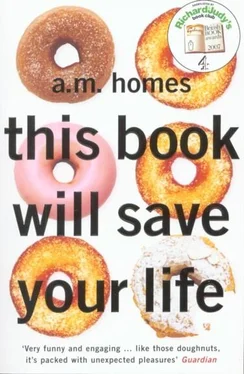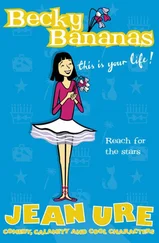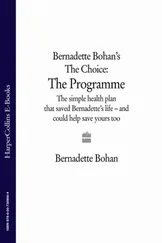"She kept the furniture wrapped in plastic — a blue sofa wrapped in clear plastic, and when it rained, she'd unroll a long plastic pebbly runner that we had to walk on."
"She was very proud of her living room. She was going to take it to Florida, but when someone finally sat on the sofa, the silk cracked — too many years under plastic, and somehow it got brittle. Do you remember cutting off my finger?"
"I didn't cut off your finger. I had a saw from a children's toolbox, and I asked you to hold something while I cut it. I missed, and a little piece of your finger came off."
"I had to get stitches."
"It wasn't a real saw anyway."
"Yeah, but it was a real finger." The brother holds up his hand, and, sure enough, his third finger is a little shorter than it otherwise might have been.
"I said I was sorry about a thousand times. I practically had a breakdown over the guilt. I can't believe you're bringing it up again now."
"I haven't seen you in a long time."
"Would it be better if I went to a hotel?"
"I'm half teasing — it's good you're here. See you in the morning."
RICHARD lies back on the bed. The room is spilling with stuff: books, a baseball glove with a ball packed into the center, pennants, prizes, model cars, flying birds dangling from the ceiling. A reading light shines through the Visible Man, an anatomical model that stands, arms spread, legs spread, offering up the meaty red view of the stuff of man, organs and arteries in a clear plastic shell.
He lies on his nephew's bed trying to remember his own life as a boy. What did he think about? Baseball, bomb shelters, air raids, the end of the world. He lies back feeling a peculiar hollow. If he called his brother's name, Theodore, Ted, Teddy, Thermador, his brother would likely come back down the hall, sit at the edge of his bed, and talk to him. The brother would be like a father, because the brother is a father and he knows how to do that. And at some point his wife, Meredith, would tap on the door and ask if everything was all right, and it would all be deeply embarrassing.
He lies back, looking at the ceiling — the sticky remains of a galaxy of glow in the dark stars.
IN THE MORNING, the house smells of toast and coffee. He dresses as though he's got a meeting to get to. Truth is, he can't imagine spending the day sitting alone in his brother's house, a passive prisoner, waiting for everyone to come home. He catches a ride into town with his sister-in-law, a New England native with little use for the rest of the world.
"It's been a hard year," Meredith says. "We thought your brother was going to get a Nobel; it was close, and then it didn't happen."
"That would be nice," Richard says, not sure if the brother is really Nobel material; it had certainly never occurred to him. "Maybe next year."
She shakes her head. "You don't come that close and then get it the next year; it's like a comet, it passes that close only once in a lifetime."
"Well, even that must feel good: how many people actually think they have a chance of winning a Nobel Prize?"
"Your brother did. Two of his close friends already have them."
"You'd have to go to Stockholm to collect it."
"Oh, we've been to Sweden. That's what we do — every summer we take a house in Italy, Greece, Spain, France."
"I didn't realize."
"Ben has come with us a few times. Ben, and sometimes you-know-who, if she can get away for a few days."
"Really? I never knew."
"Where shall I drop you?"
"Anywhere is fine."
"The Public Gardens? You can say hello to the swan boats?"
"That would be great."
NOTHING IS OPEN — it's too early. He walks around the park a couple of times, and then he takes himself out for a second breakfast. Finally the stores open, and Richard goes up and down Boylston Street shopping because he doesn't know what else to do, because he never shops, because every time he buys something he has a nice conversation with the salesperson. He buys something for everyone — for the kids, his brother, the sister-in-law, the mother-in-law, the dog, the house.
After lunch, he takes a taxi back to Brookline, puts the gifts in everyone's rooms, and falls asleep on the sofa, exhausted.
"ARE YOU SURE you're all right?" the brother asks that evening. "I know you had a scare, but now you're scaring me; is there something you're not telling me?"
"He got us a mixer," one of the children says.
"I noticed you didn't have one," Richard says.
At dinner, Richard hands out even more presents. The brother and his wife look at Richard like they feel sorry for him.
"How come we're not having cake?" the little boy says.
"Because it's not really a party," one of the adults says.
"If it's not a holiday, then why are we getting presents?"
"Because Uncle Richard came to visit."
"Are you coming back again soon?" the little boy asks.
THE PHONE RINGS — "It's Barth and Ben!" one of the girls announces. "They're in Ohio." They put the phone in the middle of the kitchen and push the speaker button, and everyone stands around.
"Is the car running well? Are you getting good mileage?" the brother wants to know.
"What did you have for lunch?" one of the little girls asks.
"Are you enjoying yourselves?" the mother asks.
"I sent you some video. It should be in your e-mail."
"Uncle Richard is here," the little boy says.
"Really? Hold on, let me get Ben."
"That's weird, really weird. Dad — what are you doing there?"
"Just came for a visit."
"Does Mom know where you are?"
"No, I didn't think I had to tell her."
"She knows," Meredith says. "We talk, I hope that's OK."
"Fine," Richard says, "it's fine." He had no idea that they talked, that everyone was so in touch.
He picks up the receiver, turning off the speaker, and presses the phone to his ear. "So how are you?" he asks, trying to sound chipper and not terrified, because suddenly he is terrified. He's talking to Ben in front of an audience, they're standing there watching, and Richard is worried he's not going to do it well enough.
"Good," Ben says. "How long are you staying there?"
"Just the weekend. I had to get out of the house — it was going downhill. So how's it going? Any big adventures so far? Sleeping under the stars?" There is silence. "You still there?" Richard asks.
"Yeah, uh, Dad, can we just talk when I get to L.A.? I mean, it's like I never talk to you and now you want to talk all the time."
"I want to hear about the trip. I like knowing that you're OK."
"I'll tell you about it when I see you. I'm OK, I'm always OK."
"All right, then," Richard says. "I won't keep you."
Richard hands the phone back to Meredith. "All done?" she asks.
"Apparently."
Meredith and the children each talk to Barth and then pass the phone to their father. Richard stands listening; he hears the ease with which his brother and nephew speak, the ease with which his brother addresses Ben; he feels the full weight of the years he missed, the gap between how he is and how he wishes he could be.
When they are done, the entire family stands over the father's computer. The movie begins. There's Barth standing outside the apartment building in New York, holding up a cardboard sign with Magic Marker lettering: "My Big American Adventure."
"I bet Ben made that; he's really good at art," the sister-in-law says.
"Welcome to our magical mystery tour," Barth says. "This is our tour bus, the trusty 2002 Volvo Cross Country wagon, with all-wheel drive, rear-window defrost, a global-positioning system, and we're off to see the wizard."
And then Ben steps into the picture; it's like seeing someone you only ever dreamed about. The images are jerky, like footage from an early moonwalk. But it's Ben, Ben all grown up. Ben as a man/boy with facial hair and muscles, Ben on the cusp of something larger — Big Ben. It hadn't occurred to Richard that Ben would look different, older. Barth and Ben are talking, but Richard isn't listening, he's just looking, studying, mesmerized. He'd never thought that Ben would look so much like him.
Читать дальше












